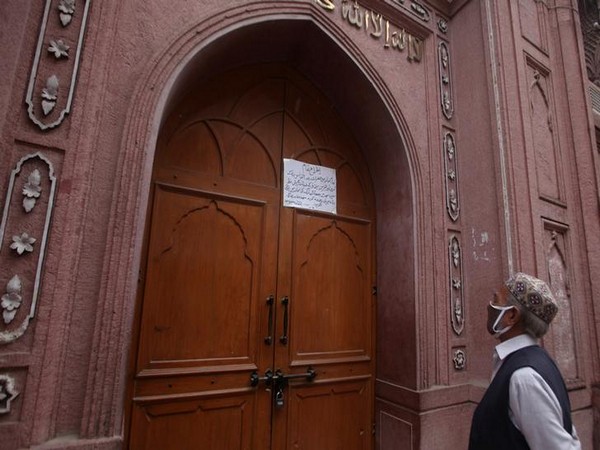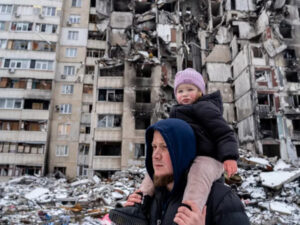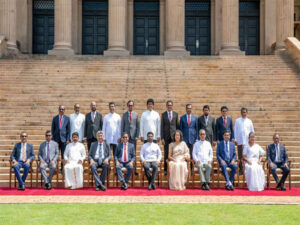
A man reads a notice, placed on the entrance door of a closed mosque during a lockdown after Pakistan shut all markets, public places and discouraged large gatherings amid an outbreak of coronavirus disease (COVID-19), in Peshawar, Pakistan March 27, 2020. REUTERS/Khuram Parvez
Islamabad [Pakistan], Apr 1 (ANI): Pakistan ‘s Sindh and Punjab share the highest number of coronavirus cases in the country, with the tally at 676 in both provinces. The country’s current tally of confirmed cases stands at 1,943. On Tuesday, Punjab reported 18 new cases, pushing the provincial tally to 676. According to a spokesperson in the Punjab health department, 207 confirmed cases are in Dera Ghazi Khan, as per Dawn.
The total number of cases from Tableeghi Jamaat (Congregation) in Hyderabad rose to 94, as 49 new cases were confirmed on Tuesday from the congregation. Out of 378 people under treatment in Sindh , 343 cases are of local transmission.
Thirty new cases have been reported in Gilgit-Baltistan, taking the total number of cases to 178, according to a COVID-19 daily situation report shared by the Gilgit-Baltistan health department. Meanwhile, 221 confirmed cases have been reported in Khyber Pakhtunkhwa and 158 confirmed cases in Balochistan.
148 cases have been confirmed in Pakistan -occupied Kashmir (PoK) while 58 cases have been confirmed in the national capital, Islamabad.

Local oil refineries in Pakistan close as demand slumps during COVID-19 lockdown
Attock Refinery Limited has closed down its largest plant, which is capable of refining a minimum of 26,000 barrels of crude oil per day (bpd), over the lack of demand in the country. The refinery’s top management, in a letter written on Monday to Secretary Petroleum Division, Mian Asad, informed the government that oil marketing companies (OMCs) have not bought products from the refinery, forcing ARL to close the plant, The News reported.
A copy of the letter, cited by The News, said that the refinery, which earlier closed down two of its smaller units, has now made the smaller plants partially operational to refine 12,000-13,000 barrels per day for the next two to three days. The government in the wake of a massive cut in the demand of petroleum products because of countrywide lockdown, had imposed a ban on OMCs from importing petrol and crude oil by refineries from April onward.
The letter further read that in view of the unfortunate situation, the top management of the refinery would be shutting down its Main Unit today on Monday (March 30).
And just to cater to the heavy crude oil produced from the Potohar Northern region and Khyber Pakhtunkhwa, it would be partially operating for the next few days “after which our crude oil storages would also top up and complete shutdown of the refinery is imminent”.
The government had last week restricted the import of crude oil and asked OMCs to procure refined oil from local refineries to cater to the needs of the citizens living in the northern areas of Pakistan so that local companies are not forced out of business by the coronavirus crisis.
If it closes, which seems imminent, it would be the third refinery in the country to halt operations because of the collapse in demand as the government implements a lockdown to try to limit the spread of the coronavirus .
On Saturday, the country’s largest refiner Byco Petroleum Pakistan Ltd halted crude processing at its 155,000 bpd refinery because of “zero demand for products in the aftermath of COVID-19 lockdowns.
Pak officials ‘scapegoating’ vulnerable Hazara Shi’a community for coronavirus: US commission

Washington, [US], Apr 01 (ANI): Expressing its concern over reports of Pakistan targeting Hazara Shi’a community for the spread of coronavirus . United States Commission on International Religious Freedom (USCIRF) on Tuesday accused the Balochistan provincial government of “scapegoating ” the already vulnerable Hazara Shi’a community for this public health crisis.
“We are troubled that government officials in Balochistan are scapegoating the already vulnerable and marginalized Hazara Shi’a community for this public health crisis,” stated USCIRF Commissioner Anurima Bhargava.
“This virus does not recognize religion, ethnicity, or border and should not be used as an excuse to discriminate against a single community,” Bhargava added. In the provincial capital Quetta, the government completely sealed off two Hazara areas–Hazara Town and Marriabad–as part of a lockdown in the city; forbade government employees from traveling into Hazara neighborhoods; and reportedly forced Hazara policemen to go on leave under suspicion they are infected by relatives. Pakistan has reported 1,943 coronavirus cases.
On 26 February, Pakistan confirmed its first two cases of the coronavirus . As per Pakistan i media, the initial cases were pilgrims from Iran, especially those who returned after crossing the border at Taftan. Social media users have made allusions to coronavirus as the “Shi’a virus,” given fears of its spread by pilgrims returning from Iran.
This isolation and further stigmatization of the Hazara minority could limit their ability to receive proper medical care as the coronavirus continues to spread within Pakistan and stretch its public health infrastructure. USCIRF Commissioner Johnnie Moore added, “We are gravely concerned about Pakistan ‘s Hazara Shi’a community. We understand the many challenges the Pakistan i government, and many other governments around the world, are facing to contain this deadly virus.
Yet, we urge the Pakistani leadership to work to protect all its citizens, regardless of religion or belief, and ensure that everyone has equal access to the necessary medical treatment. In fact, governments have a greater obligation to protect the most vulnerable in an emergency like this one.”
In its 2019 Annual Report, USCIRF noted the rise in sectarian violence in Pakistan in recent years, and how Hazara Shi’a Muslims have been targeted by extremist groups including the Islamic State, Lashkar-e-Jhangvi, and the Pakistan i Taliban. (ANI)

















